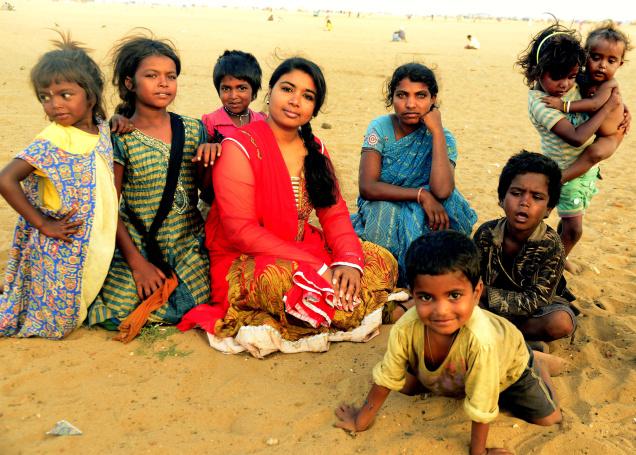
Meet M. Swetha, Tamil Nadu’s first Engineering graduate from the Narikuravar community.
“Did you hear what he said?” asks M. Swetha, widening her eyes. We’re at the Marina beach for a photo shoot, and a small crowd has gathered. An onlooker makes a rude comment directed at one of the gypsy girls standing next to her. Swetha is disgusted. This is perhaps what sets her apart from her tribe. Narikuravar herself, she refuses to ignore the way society crinkles up its nose at the sight of people from her community. Swetha is the first Narikuravar girl in Tamil Nadu to get an Engineering degree — a feat that took her years of struggle to achieve.
The 22-year-old is caught between the excitement of the new possibilities that life brings her, and the responsibilities that rest on her shoulders. “Right now, all I want to focus on is my parents’ NGO, Narikuravar Education and Welfare Society in Tiruchi,” she says. Swetha is now the voice of her people. They have so many things to prove to the world — demands such as a Bill that provides them ST status. And it’s people like her who give the community hope.
But behind her every move is her mother M. Seetha, who hides a fiery nature beneath her smiling demeanour. Seetha had studied till Class X herself, and was bent upon educating her children. It began as a protest against the cloistered nature of her people. “We are from Devarayaneri on the outskirts of Tiruchi,” says Seetha. “When Swetha started school, there were no buses between our village and the outside world.”
And so, a whole community lived as though on an island. Parents sold beads and trinkets for a living, and their children stayed at home to cook and care for their younger siblings or followed them on their work trips. Girls as young as 13 were married off, and those who dared to marry outside their community were ousted from the village. “We are extremely traditional and have been following certain customs for years,” says Seetha.
But she wanted a change. How long could they go on this way? Young, and a little fearful back then, Seetha took a revolutionary step: she sent her daughter to school. She went with Swetha to school and back; for there were deserted stretches along the way to be covered on foot. “I would wait till school got over and bring her back,” remembers Seetha.
Swetha studied under the tutelage of her hawk-eyed mother, who faced opposition from her community every day. “Someone or the other would block our path as we walked to school, asking me why I was earning everybody’s hatred,” says Seetha. Swetha faced discrimination at her end too; sometimes veiled, and sometimes downright. “She would hush me if I spoke our language when I accompanied her to school,” laughs Seetha. “She didn’t want anyone to know who we were.”
Hostel wardens who used crude casteist language, incidences that made her almost quit college, constant threats from her community… Swetha grit her teeth through it all to get an engineering degree. Some others from her community followed suit — today, there are several youngsters who are educated and working in mainstream society.
But not all of them make it past Class X. Seetha states instances where Narikuravar children are asked to bring beads from home for their classmates. “Won’t this embarrass them?” she asks. As a result, they drop out of school and take to what their parents and grandparents did.
Swetha now attends fundraiser meetings with her mother and goes door-to-door to request Narikuravar people to send their children to school. Her parents run a school for children from their community that’s fallen on hard times, and she’s helping them get back on their feet. Ask her if she wants to work in the field of her education — she’s trained in Computer Science Engineering — and she hesitates. “I’ve not thought about that for now,” she smiles. One step at a time.
source: http://www.thehindu.com / The Hindu / Home> Features> MetroPlus> Society / byAkila Kannadasan / March 18th, 2016